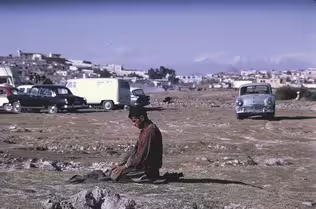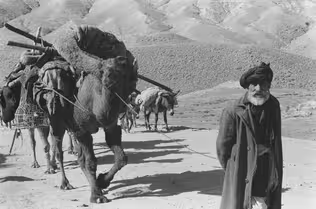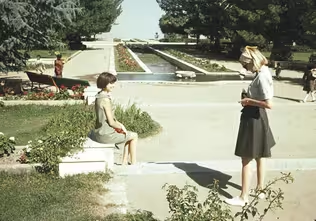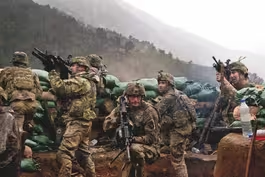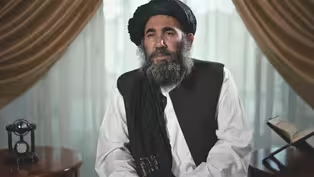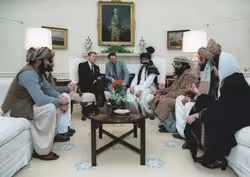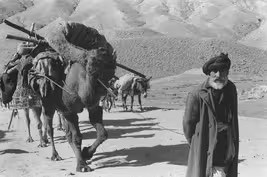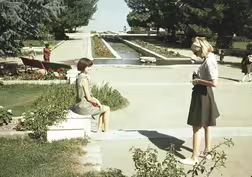
Afghanistan: The Wounded Land - Part 1: Kingdom
Season 5 Episode 1 | 54m 4sVideo has Closed Captions
Afghanistan opened to the world in the 1960s. When communists seized power, a war began.
In the 1960s, King Mohammed Zahir Shah opened up Afghanistan to the world. The city of Kabul looked like a European capital and the country was a destination for hippies in search of drugs and adventures. But Afghanistan was divided between the westernized elite and the majority population that was both traditional and poor. When communists seized power in 1978, a never-ending war began.
Problems playing video? | Closed Captioning Feedback
Problems playing video? | Closed Captioning Feedback
Funding provided by the Corporation for Public Broadcasting. Additional funding provided by the John D. and Catherine T. MacArthur Foundation and the Wyncote Foundation.

Afghanistan: The Wounded Land - Part 1: Kingdom
Season 5 Episode 1 | 54m 4sVideo has Closed Captions
In the 1960s, King Mohammed Zahir Shah opened up Afghanistan to the world. The city of Kabul looked like a European capital and the country was a destination for hippies in search of drugs and adventures. But Afghanistan was divided between the westernized elite and the majority population that was both traditional and poor. When communists seized power in 1978, a never-ending war began.
Problems playing video? | Closed Captioning Feedback
How to Watch Doc World
Doc World is available to stream on pbs.org and the free PBS App, available on iPhone, Apple TV, Android TV, Android smartphones, Amazon Fire TV, Amazon Fire Tablet, Roku, Samsung Smart TV, and Vizio.
Providing Support for PBS.org
Learn Moreabout PBS online sponsorshipMore from This Collection
Afghanistan: The Wounded Land - Part 4: Trap
Video has Closed Captions
After 9/11, the U.S. invaded Afghanistan. Many Afghans hoped for peace and democracy. (54m 27s)
Afghanistan: The Wounded Land - Part 3: Taliban
Video has Closed Captions
While fighting in Afghanistan turned into a civil war, the Taliban emerged triumphantly. (54m 5s)
Afghanistan: The Wounded Land - Part 2: Jihad
Video has Closed Captions
In 1979, the Soviets invaded Afghanistan. "Soviet Vietnam" began after a call for Jihad. (53m 23s)
Providing Support for PBS.org
Learn Moreabout PBS online sponsorshipANNOUNCER: The following program contains material that may be disturbing.
Viewer discretion is advised.
ZOHRA YOUSOUF: Living in Kabul was so romantic.
We were happy in Kabul.
ANNOUNCER: Afghanistan in the 1960s.
YOUSOUF: Elite class of Afghanistan, they were not thinking about what was gonna happen in the country.
ANNOUNCER: A series of revolutions and uprisings sparked political upheaval that would last until today.
Afghanistan: The Wounded Land-- Kingdom on Doc World.
♪ ♪ MASOOD KHALILI: Wow, what a beautiful land I have.
Beautiful sky like a hanging ocean.
Look at the mountain, touching the sky!
Look at the rivers so vast, so nice!
Wow!
God has given us so much beauty.
What a land!
♪ (wind whipping, kite flapping) (kids shouting playfully) YOUSOUF: Living in Kabul was so romantic.
We were happy in Kabul.
SHUKRIA BARAKZAI: Cinemas, restaurants, hotels.
It was better than Europe, I guess.
♪ SIMA SAMAR: It was a lot of tourists traveling with their long hair and their hippie-style clothes.
And they were going to the historical places that we have.
♪ (children chattering) ♪ BARAKZAI: I have a dream: to have my country back.
Would you think that's too much?
That's too big?
♪ NARRATOR: This is the story of a land as beautiful as it is cursed.
A country trapped in war for so long, few can remember how it all began, or why.
Money?
Power?
Religion?
No one has a clear answer.
What went wrong in Afghanistan?
This rugged land remains a mystery.
♪ It is in the heart of Asia, surrounded by ancient civilizations.
Yet for centuries, Afghans remained isolated, hidden behind their famed towering mountains.
♪ Divided into tribes, they were united mainly by their Islamic faith and their fierce desire for independence.
Many conquerors and great armies invaded this nation, from Alexander the Great to the British Empire, but they all faced the legendary resistance of the Afghans.
♪ In the '60s, one man tried to change everything.
King Zahir Shah.
He had a dream: to modernize the country.
He installed democracy and opened up the nation to the world.
REPORTER: In his business-like office at the royal palace, Mohammed Zahir Shah lays aside the pomp of royalty, and devotes himself to affairs of state with the direct simplicity of any wise, modern chief executive.
NARRATOR: His wife, Queen Humaira, was a modern first lady.
She dared to appear in public without a veil, shocking many in this conservative Islamic country.
♪ (speaking French): ♪ NARRATOR: The king traveled abroad and took inspirations from the leaders he met.
It was the time of the Cold War and the world was divided in two blocks.
But King Zahir did his best to keep Afghanistan independent.
ASSEFI: REPORTER: Not far from Kabul at Surobi, a corps of European engineers have been brought in to harness the river there so that Kabul may have more electric light and power.
NARRATOR: Thanks to its neutrality, Afghanistan was able to attract financial help from both sides.
The Americans built dams in the south, while Soviet engineers built bridges, roads, and tunnels across Afghanistan.
The country was no longer isolated.
♪ Kabul came to resemble a European capital.
Afghan children could learn French, German, and English.
SAMAR: Boys and girls were together until 12th grade.
♪ So we were playing together, there was basketball ground, there was volleyball ground, there was football ground.
♪ Honestly, I was focusing on my studies, but I was quite-- how to say-- I was a little naughty, I would say.
We were going to cinemas, we were skipping some classes.
(music playing, projector reel whirring) ♪ KHALILI: Well, we had two or three cinema theaters.
In the beginning there was no translation.
And we were watching and loved it.
Films like Ben-Hur, like Doctor Zhivago.
Oh my goodness!
So easily they say "I love you."
For us it was just on the ground make a heart and with an arrow, and you know, some drops of blood coming down, and then the girl was coming and seeing, accepting or not.
But there-- "I love you."
Wow.
BARAKZAI: Kabul was a totally a different place.
I would say it was a modern city, with lots of restaurants, jazz music live.
♪ Inside, whenever the door was open, two things I remember.
First: the big, loud, live jazz sound music.
Which was playing live.
(jazz music playing) Plus lots of smoke.
People over there inside of that room was been smoking a lot.
You can't believe in, even you can't imagine it was better than Europe, I guess.
Most people would not realize that Afghanistan back then (chuckling): produced brandy or wine.
Right here in Kabul.
The Intercont had a wonderful swimming pool on the top floor, had the best nightclub.
For an Islamic country of that era, we were probably the most open-minded of the area.
(rock music playing) Then came in the tourist era.
♪ (gravel crunching) NARRATOR: The country was now accessible and the first tourists arrived.
(car horn honking) Most of them were hippies.
On their way to India, they stopped here to discover an exotic culture, and taste the local hashish.
SAMAR: It was a lot of tourists coming to different parts of the country.
They were traveling with the local bus with their long hair, and the hippie-style clothes, and they were going to the historical places that we have.
To Bamiyan to see the Buddhas, and to Herat.
♪ KHALILI: From America, from Germany, from Italy, from France, from these European countries they were coming.
There were hippies and non-hippies.
Of course, some of them (laughing): having hashish in their hand and smoking... which we didn't like it.
My mother was always saying that "Be careful!"
♪ WOMAN (in German): PRODUCER: WOMAN: PRODUCER: WOMAN: ♪ KHALILI: Beautiful girls!
Oh, we boys even were just looking that, "Oh my goodness!
"Golden hair?!
Blue eyes?!
” Of course, little bit, you know, weird clothes, but anyway.
We boys, especially younger generation, we could see and in no time, we found that boys had longer hair.
Instead of the tourists following us, we were following the tourists.
REPORTER (in French): (jazzy music playing, people chattering) When I was in 12th grade in high school, one thing, good thing happened to me: I became Miss Afghanistan in 1972.
(applause) (camera shutter clicking) (laughter, indistinct chatter) One class of the society call us Westernized people, you know, because we dress like Western people.
We live like Western people, you know, and we were listening to their music.
We thought this is a way of life for us.
(wind howling) NARRATOR: Truth is, Kabul and its fashionable elite were living in a bubble.
In the far-off provinces, where 80% of Afghans lived, the situation was very different.
Poor and illiterate, rural Afghans followed ancient cultural traditions.
Women were segregated and could be bought for marriage.
Religion was the ultimate authority.
GHANI: A lot of the Afghans, or the 40-odd families that run this country, majority of them acted like British aristocrats, unfortunately.
They were great for the cities, but they really annoyed the villages.
YOUSOUF: Elite class of Afghanistan, they were not thinking about what was gonna happen in the country.
We were sort of sleeping those days.
We didn't see the reality, unfortunately, because of our class differences.
(hammers tapping, people clamoring) ASSEFI: (man chanting) NARRATOR: The Muslim clergy was uncomfortable with the changes the king had brought to the nation.
Democracy and women s rights were distant concepts to them.
Many of those living in the provinces shared the same concerns.
And some felt left behind, excluded from the privileges of the elite.
♪ HEKMATYAR (speaking Afghan language): NARRATOR: The Soviet Union was not just building bridges for Afghanistan.
Young officers were trained by the Soviet Army and the best students were invited to Moscow.
Many of them returned home with a new ideology.
♪ By the end of the '60s, students across the world were sharing revolutionary ideas.
(indistinct shouting) Turmoil was everywhere, and Afghanistan was no exception.
(explosions, screaming, whistle blowing) (indistinct shouting) ASSEFI: (bang, shouting) KHALILI: New ideas and new ideologies, and we were young boys and hearing from... "Oh, Lenin, who is he?"
The students are standing.
What else?
In Czechoslovakia, there is a big revolution.
What about others?
Oh, in Latin America, in Spain, in different countries.
What is that?
The world is changing.
What we should do?
Fasten your seatbelt!
♪ SAMAR: In terms of women movement, it was all over.
So Afghanistan also got that kind of ideas.
I had to marry in order to go to university.
But honestly, I think that, now I think that we were already feminists without knowing the word of "feminist."
My husband was teaching at the university.
From the beginning I told him that I cannot be an obedient wife.
So I can be a good friend, and we have to have 50% rights both of us.
So we really had 50%, and we were famous within the family.
That when the family were seeing us, they were saying, "How is the other 50%?"
♪ NARRATOR: The Afghan communists preached equality between all men and women.
They dreamed of a socialist revolution.
♪ MAZDAK (speaking Afghan language): ♪ NARRATOR: The communist ideology was at odds with the Muslim faith.
It denied the existence of God and, for many Afghans, that was simply unacceptable.
HEKMATYAR: (chanting) (chanting continues) NARRATOR: The university had become a powder keg.
As in many Western countries, opposing political ideologies clashed on the streets.
In Kabul, students were split into two rival factions: the communists on one side, the Islamists on the other.
MAZDAK: ♪ ♪ (indistinct shouting) NARRATOR: Afghans in the countryside had bigger problems.
A long drought had ravaged their land.
Thousands starved to death and the king did very little to help them.
King Zahir's popularity was in tatters.
Some started to plot against him.
♪ On Tuesday, July 17, 1973, while the king was in Italy, the monarchy ended with a military coup.
Army officers, trained in the USSR, turned against King Zahir.
His cousin and former prime minister Daoud Khan formed an uneasy alliance with the Communist Party and became the country's first president.
A republic was proclaimed.
REPORTER: The new regime has the backing of Afghanistan's small but powerful army; and that in turn is supplied and equipped by the Soviet Union.
The heavy weapons come from the Red Army.
(planes roaring) SAMAR: I remember that we were in the university when the... some noises were started.
We, I personally and a lot of... all of the people in Kabul, we've never heard them, the jet fighters' noise.
(cheers and applause) REPORTER (speaking French): (cheers and applause) NARRATOR: The king was forced into exile.
The monarchy's end opened an era of political turmoil that has lasted until today.
(cheers and applause) ♪ YOUSOUF: When President Daoud did a coup d'état in 1973, the next morning people were sort of happy, they thought, "Okay, because President Daoud took power, "change will come, the country will develop, you know.
Everything will change."
NARRATOR: President Daoud Khan promised social reforms on multiple fronts.
For instance, he would take land from owners, and give it to peasants.
♪ KHAN (speaking Dari): ♪ NARRATOR: In the same years, Afghan women became more vocal in claiming their own rights and autonomy.
♪ (speaking Dari): SAMAR: In 1975, when they announced the International Day for Women, 8th of March, I got a present from my fiancé on that, for that reason.
So it was, somehow, we start to be, to say that it is, it should be more equality between man and woman, and it should not be discrimination.
(jet engine roaring in distance) NARRATOR: Daoud Khan proved to be an authoritarian president.
Suspicious to the edge of paranoia, he persecuted the Islamists, who disliked his reforms and his alliance with communists.
(thudding) HEKMATYAR: MAZDAK: (indistinct chatter) NARRATOR: Daoud Khan ruled the country with an iron fist.
He suspended the constitution.
Demonstrations were forbidden.
Islamic activists were arrested.
Some of them escaped to Pakistan, and prepared an insurgency.
(indistinct chatter) This revolution is an Islamic revolution and it has its special aims and goals, which is to establish an Islamic, a pure Islamic system in Afghanistan.
Freedom of Afghanistan, and liberation of Afghanistan.
BARAKZAI: The Islamic movement was blaming like, the communist, that they are saying this, and they were blaming, you know, this blaming game between left and right political ideology was start from the very beginning, which is, both of them were extremely immature.
Immature to lead the country, immature to guide a people, immature to keep the great value of national unity among the people.
NARRATOR: In a few short years, Daoud Khan had made himself powerful enemies.
First the Islamists and the landowners, now the communists and the mighty USSR.
♪ In a visit to Moscow, Daoud Khan made the fateful decision to break ties with the USSR.
The Soviet leader Brezhnev wanted to take advantage of the coup, to extend his influence in Kabul.
But Daoud Khan refused.
A true Afghan, he was too proud to take orders from abroad.
Back in Afghanistan, Daoud Khan signed what amounted to his own death sentence: he ordered the arrest of the same communist leaders who had helped him overthrow the king.
♪ ♪ The assassination in jail of a leftist intellectual triggered a new coup.
♪ GHANI: Kabul was a small circle.
It was 200,000 people, and from 200,000 people, maybe 500 of them were involved in this kind of thing.
If you were part of that circle, you could easily tell that things were coming to an end.
♪ NARRATOR: In April 1978, supported by the army, the Afghan communists seized power.
Overnight they slaughtered Daoud Khan and 23 members of his family.
They called it the April Revolution.
REPORTER (speaking French): REPORTER: Tanks loyal to the young communist army officers now guard the palace where President Daoud, the last of the Afghan royal family, ruled.
Inside, he and his family, including his young grandchildren, were shot dead when his palace guard lost their courageous battle to defend him.
ASSEFI: YOUSOUF: I came to the ministry of culture, you know, I was working there.
And I saw that everybody was running, and I said, "Where are you going?"
And they told me, "You don't know?
"A coup d'état happened.
See the palace?
There is a fire in the palace."
5:00 in the morning, the Radio Kabul announced that President Daoud was killed with all his family.
And that was a tragedy for all of us.
I cried a lot, to tell you the truth.
I cried-- my father was so sad, my brothers.
Because first of all, we knew all President Daoud.
And second, he was killed with all his family, his daughters, his grandchildren, his sons, his wife, you know?
♪ TARAKI: We were feeling that, in very near future, Daoud would do something against us.
Our colleagues were obliged to fire back.
And he and some of his family members were destroyed.
(cheers and applause, whistling) NARRATOR: This was the new president: Taraki.
And this his prime minister, Amin.
Together, they tried to transform Afghanistan into a socialist country.
They enforced land reforms and confiscated property.
They made education obligatory for girls.
Women now had full rights, they were free to study, to work, and choose their husbands.
♪ (speaking French): NARRATOR: To implement their changes, Taraki and Amin used Stalinist methods.
They exterminated all opposition, even from the left wing.
Islamists were the major targets of repression.
Mosques were closed, the veil banned in public spaces.
For a conservative Islamic country, it was all too much, too soon.
Afghanistan was headed toward the abyss.
♪ SAMAR: That was the most brutal time of the history in the country.
Thousands of people from all walk of life was, was taken and disappeared.
♪ KHALILI: For a communist, the best Muslim was the one who was killed.
Thousands who lost their lives in Afghanistan.
Young boys and girls from all over.
Prison was just full.
Everyday killing.
Killing of someone, and excuse that he's a Muslim, was easy-- kill him.
My family, family of my wife, lost 16 members, including her father, in one night, shot dead by the communists.
(distant clamoring echoes) ♪ YOUSOUF: You think probably somebody knock at your door and tell you you're next.
You go to prison, you know, and you don't know why.
♪ BARAKZAI: I remember when I was just only in the fourth grade, and I was, like, almost a nine-years-old girl, and that there was a kind of propaganda that if you pray, they will arrest you at school.
That was unbelievable, that if you pray you will go to jail.
SAMAR: My husband was a normal teacher in the science faculty.
They came to our house and took my husband.
They knock our door, and they came in.
And it was a group of people who were leaded by his student.
And he never came.
Never...
I never heard from him.
(indistinct chatter) (applause) ASSEFI: NARRATOR: In March of 1979, the Islamists decided to take the streets against the communist government.
They gathered weapons from soldiers who had defected from the army.
Their leaders came back from Pakistan.
An uprising began.
HEKMATYAR: ♪ CROWD (chanting in Dari): Today it might be us, but tomorrow it will be you!
You will suffer just as much as we have!
CROWD (chanting): Long live (indistinct)!
Long live Afghan!
♪ (crowd chanting) MAN (in Dari): HEKMATYAR: (indistinct chatter) NARRATOR: The government in Kabul was crumbling.
Taraki asked Moscow for help with the insurgency, unaware that his chief enemy was his own right hand.
In autumn 1979, Amin did something that shocked everyone.
He ordered the assassination of Taraki.
He wanted power for himself.
Once he became president, Amin even commissioned a film, in which he acted as the real father of the revolution.
Afghanistan was out of control, and close to falling into the hands of the Islamists.
NARRATOR: In Moscow, the Soviet leaders worried.
They feared the Islamist revolution would prevail in Afghanistan, like it had in Iran earlier that year.
Afraid of repercussions back home, where 50 million Muslims lived, and certain that the Americans would exploit the Afghan chaos, Brezhnev decided to act.
In December 1979, Soviet troops entered Kabul.
Their mission was to kill President Amin and restore order.
REPORTER: Soviet troops have been arriving in increasing numbers since early December.
Then, on Christmas Eve, the arrivals increased dramatically.
For two days and nights, Soviet planes landed at Kabul Airport, bringing an airborne division of around 6,000 men.
Helicopters, too, landed in front of the astonished gaze of airport passengers.
It was a whole week when planes were coming non-stop, there was noise in the Kabul sky.
(engine roars) ♪ (speaking Russian): (wind whipping) (crowd cheering, music playing) NARRATOR: As a goodwill gesture towards Afghans, the Soviets released all political prisoners.
People in Kabul rushed to the prison to reunite with their relatives.
REPORTER: Word has spread the Soviet military was releasing political prisoners detained by President Amin.
Soon crowds were streaming in from all directions.
Everyone was a friend or a relative of a detainee, and their numbers gave ample evidence of the severity of the former president's rule.
In fact, it's estimated that as many as 10,000 political prisoners were released in a single day.
(crowd cheering, clamoring) (chattering) ♪ (speaking Afghan language) (sobbing) REPORTER: Among the joy though, there was tragedy for those who didn't find the relative they sought.
For this woman, it was her husband.
(frantic conversing, wailing) (exhales) (sniffles) (distant chatter) (conversing in French) NARRATOR: At first, Afghans tolerated the Soviet presence.
But soon, they realized the troops had no plans to leave the country.
They had come to stay.
Afghans could not accept a foreign occupation.
Like their ancestors, they weren't afraid of making a stand against the invaders.
Allahu Akbar!
SAMAR: There was a lot of protest, including the protest that I participated, personally with my sister, participated, where a lot of people came to the street.
And a lot of people were shouting Allahu Akbar at night.
It was three nights that the whole... you would feel that the whole city is, is moving.
Because it was, everybody was on top of the roof and they were shouting Allahu Akbar.
(crowd shouting, cheering) (shouting echoes, fades) YOUSOUF: We saw Soviet soldier on the street, and this was too much for the people of Afghanistan.
And that time, you know, really, I said, "No.
"It's time for me to leave this country.
This is not my country anymore."
It was a very hard decision.
I never wanted to leave Afghanistan.
I loved Afghanistan.
But the wind of war changed everything.
♪ HEKMATYAR: ♪ (wind whipping) KHALILI: I was doing my PhD in India.
And I was so happy that I will do my PhD and I will be called Dr. Masood Khalili-- in my family, the first.
One evening, I received a call.
"What do you do, son?"
"I'm doing my PhD, Dad, and I'll be called Dr. Masood Khalili."
"Did you hear that the communists took over?"
"Yes."
"While your people are fighting for freedom, you do your PhD?
Do you love your land?"
"Yes."
"Your home?"
"Yes."
"It's under occupation."
"Yes."
"No, son, join your people, fight for freedom.
"Get your PhD from the mountains of Afghanistan, from the university of people."
After a week, I was in the mountains.
Thank to my father, that he told me to join the liberation war, and I helped my people when I was young.
I loved this country when I was seven, and I love this country when I am 70.
Love does not need logic.
It needs sacrifice.
♪ ♪ (wind whipping) ♪
Afghanistan: The Wounded Land - Part 1: Kingdom | Preview
Video has Closed Captions
Preview: S5 Ep1 | 30s | Afghanistan opened to the world in the 1960s. When communists seized power, a war began. (30s)
Afghanistan: The Wounded Land - Part 1: Kingdom | Trailer
Video has Closed Captions
Preview: S5 Ep1 | 1m 43s | Afghanistan opened to the world in the 1960s. When communists seized power, a war began. (1m 43s)
Providing Support for PBS.org
Learn Moreabout PBS online sponsorshipSupport for PBS provided by:
Funding provided by the Corporation for Public Broadcasting. Additional funding provided by the John D. and Catherine T. MacArthur Foundation and the Wyncote Foundation.
